Scientific Computation - Applied Mathematics
Click above to view the certificate brochure
Program Manager
Prof. Frank Giraldo, Ph.D.
Spanagel Hall, Room 240B
Phone: (831) 656-4490
Fax: (831) 656-2355
fxgirald@nps.edu
Brief Overview
The Scientific Computation academic certificate provides education in the use of mathematical analysis and numerical solution techniques to model science and engineering problems on computers. Scientific Computation has become the third pillar of scientific research, a peer with traditional methods of physical experimentation and theoretical investigation, and as such has emerged as an area critical to the success of the mission of the Navy and the Department of Defense. High performance computers are already widely used in weather prediction, modeling ocean dynamics, design and testing of advanced weapons systems, development of new smart materials, etc. And it has become very clear that even more broad application of scientific computation will be essential to accelerate scientific discovery for national competitiveness and global security.
A thorough understanding of the mathematics underlying the algorithms is essential for the correct interpretation and further development of computational approaches in science. The Scientific Computation certificate program is designed to provide that very background. It is comprised of four courses – the first two of these are fundamental and the other two are selected from a group of nine courses that allows the certificate to be tailored to a specific area of interest. Upon successful completion of the coursework, students will be awarded a certificate of accomplishment in keeping with standard practices of the Naval Postgraduate School.
Requirements for Entry
Prospective students must meet the necessary prerequisites for the courses in the program.
Entry Date
Program entry dates are flexible and students who wish to pursue this certificate should coordinate with the program manager.
Program Length
Variable.
MA Academic Certificate Requirements
To earn the academic certificate students must pass all four courses with a C+ (2.3 Quality Point Rating (QPR)) or better in each course and an overall QPR of 3.0 or better. Students earning grades below these standards will need to retake the courses to bring their grades within standards or they will be withdrawn from the program.
Required Courses
- MA3046 Matrix Analysis (4-1)
This course provides students in the engineering and physical sciences curricula with an applications-oriented coverage of major topics of matrix and linear algebra. Matrix factorizations (LU, QR, Cholesky), the Singular Value Decomposition, eigenvalues and eigenvectors, the Schur form, subspace computations, structured matrices. Understanding of practical computational issues such as stability, conditioning, complexity, and the development of practical algorithms. Prerequisites: MA2043 and EC1010. - MA3232 Numerical Analysis (4-0)
Provides the basic numerical tools for understanding more advanced numerical methods. Topics for the course include: Sources and Analysis of Computational Error, Solution of Nonlinear Equations, Interpolation and Other Techniques for Approximating Functions, Numerical Integration and Differentiation, Numerical Solution of Initial and Boundary Value Problems in Ordinary Differential Equations, and Influences of Hardware and Software. Prerequisites: MA1115, MA2121 and ability to program in MATLAB and MAPLE.
And any two from
- MA4237 Advanced Topics in Numerical Analysis (V-0)
The subject matter will vary according to the abilities and interest of those enrolled. Applications of the subject matter to DoD/DoN are discussed. Prerequisites: Consent of instructor. - MA4242 Numerical Solution of Ordinary Differential Equations (4-0)
Adams formulas, Runge-Kutta formulas, extrapolation methods, implicit formulas for stiff equations; convergence and stability, error estimation and control, order and stepsize selection, applications. Prerequisites: MA3232. - MA4243 Numerical Solution of Partial Differential Equations (3-1)
Finite difference methods for parabolic, elliptic, and hyperbolic equations, multi-grid methods; convergence and stability, error estimation and control, numerical solution of finite difference equations, applications. Prerequisites: MA3132, MA3232 suggested. - MA4245 Mathematics Foundation of Galerkin Methods (4-0)
Variational formulation of boundary value problems, finite element and boundary element approximations, types of elements, stability, eigenvalue problems. Prerequisites: MA3132, MA3232 or equivalent. - MA4248 Computational Linear Algebra (4-1)
Development of algorithms for matrix computations. Rounding errors and introduction to stability analysis. Stable algorithms for solving systems of linear equations, linear least squares problems and eigen problems. Iterative methods for linear systems. Structured problems from applications in various disciplines. Prerequisites: MA3046, or consent of instructor, advanced MATLAB programming. - MA4261 Distributed Scientific Computing (3-2)
General principles of parallel computing, parallel techniques and algorithms, solution of systems of linear equations, eigenvalues and singular value decomposition, domain decomposition and application (e.g., satellite orbit determination and shallow water fluid flow). Prerequisites: MA3042 or MA3046, MA3132, and MA3232. - MA4311 Calculus of Variations (3-0)
Euler equation, Weierstrass condition, Legendre condition, numerical procedures for determining solutions, gradient method, Newton method, Transversability condition, Rayleigh Ritz method, conjugate points. Concepts are related to geometric principles whenever possible. Prerequisites: MA2121 (programming experience desirable). - MA4377 Asymptotic and Perturbation Methods I (3-0)
Advanced course in the application of approximate methods to the study of integrals and differential equations arising in physical problems. Topics covered include: asymptotic sequences and expansions, integrals of a real variable, contour integrals, limit process expansions applied to ordinary differential equations, multiple variable expansion procedures and applications to partial differential equations. Prerequisites: MA3132. - MA4620 Theory of Dynamical Systems (4-0)
This course provides an introduction to the theory of dynamical systems providing a basis for the analysis and design of systems in engineering and applied science. It includes the following topics: Second order linear systems; contraction mapping, existence and uniqueness of solutions; continuous dependence on initial conditions; comparison principle; Lyapunov stability theorems; LaSalle's theorem; linearization methods; nonautonomous systems; converse theorems; center manifold theorems; and stationary bifurcations of nonlinear systems. Prerequisites: MA2121.


